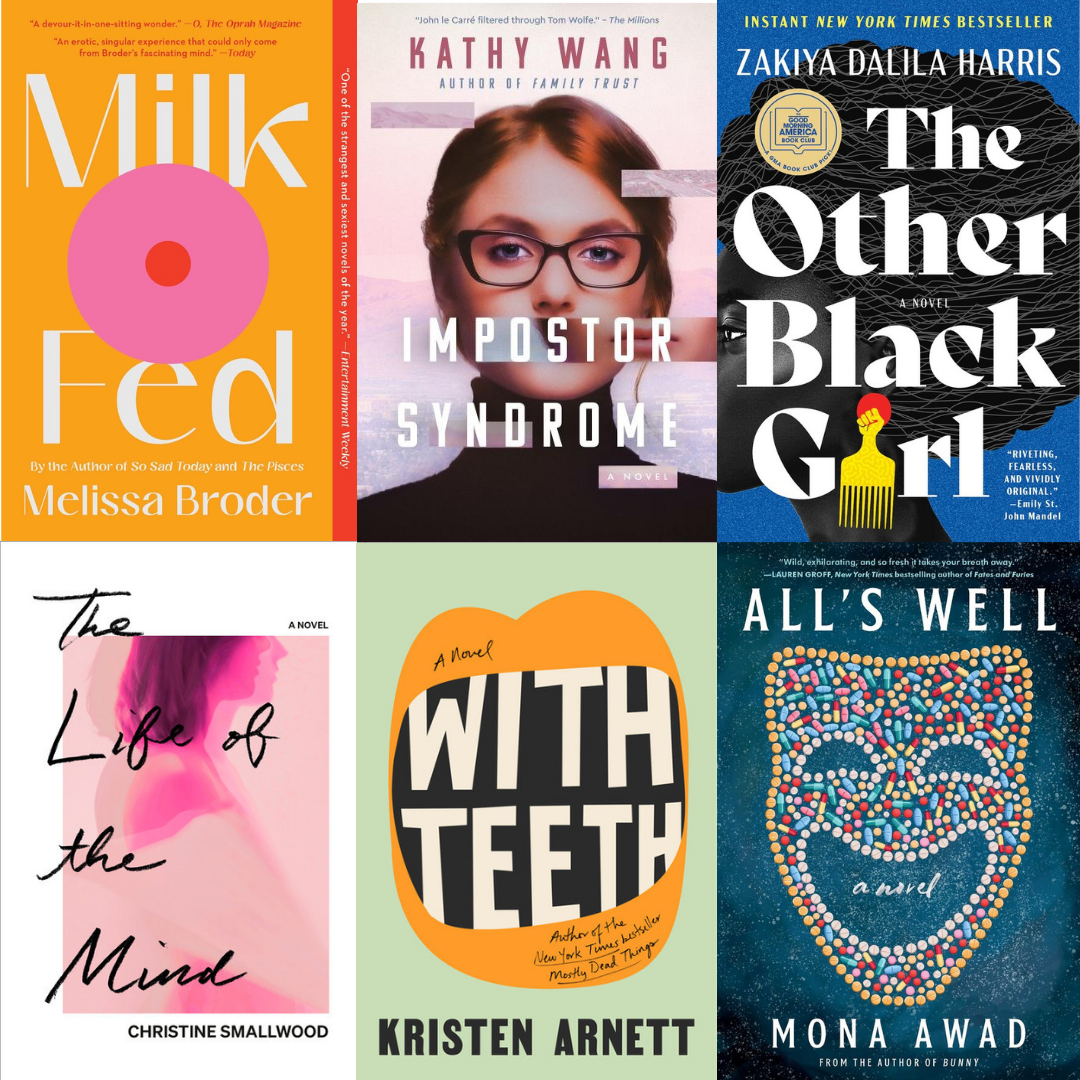
Contributor Bio
Caroline Tew
More Online by Caroline Tew
FUNNY GIRLS: New Books by Women with a Sense of Humor
by Caroline Tew
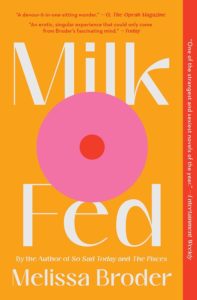
Scribner
It’s hard to talk about funny female authors without mentioning Melissa Broder. Her latest novel, Milk Fed (Scribner) has a giant pink nipple on its cover, after all. The novel follows a lapsed Jew, Rachel, who finds herself obsessed with an overweight Orthodox yogurt-shop employee named Miriam. Miriam’s constant desire to mother and feed Rachel is made more complex by Rachel’s fraught relationship with her own mother and her struggles with an eating disorder.
“Life was a lot less bleak when you were staring straight down the barrel of a burrito,” Rachel admits, and even those who don’t struggle with disordered eating can relate. While the scathing but hilarious insights on adulthood, dieting, religion, and family drama sustain the first half of the novel, Milk Fed soon veers off the rails. Sex dominates the second half—smells, visceral descriptions, and outlandish fantasies—as Miriam becomes not just Rachel’s friend and stand-in mother, but also her lover. There is a brief argument about the Israeli-Palestinian conflict that doesn’t feel fully fleshed out, then the sex resumes. The pithy remarks of the first half have gone, leaving the book feeling like an off-kilter porno.
•

Custom House
Kathy Wang’s second novel, Imposter Syndrome (Custom House), embraces satire fully and to the end. Julia, a female tech giant and undercover Russian spy, is uncovered by a lowly employee, Alice; but really the novel’s entire purpose is to satirize the male-dominated realms of both the spy genre and the tech industry. Julia’s cover as the “Sweetheart of Silicon Valley” who bakes cookies and aspires to motherhood works because, in the world of tech, journalists are always on the lookout for “a female executive to quote—please, any woman!”
Wang’s critique of the spy genre—Julia’s male handler doesn’t understand the hoops she must jump through to keep up appearances as a kindly yet no-nonsense female exec—is spot-on. Unfortunately, she is overcommitted to the bit. While the novel promises excitement, the denouement—an attempt to undermine a Russian cyberattack—is carried out by a bumbling cast of characters. Readers promised “John le Carré filtered through Tom Wolfe” will surely be disappointed.
•
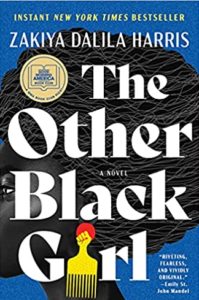
Atria Books
It’s clear that scathing but pithy interrogations of women in the workplace are a trend this summer, but no one does this quite so well as Zakiya Dalila Harris in her debut novel, The Other Black Girl (Atria). Although at its core, the book is a serious examination of the difficulties of being a Black woman at a publishing company, there’s plenty to laugh about. “Just the mention of Williamsburg [ … ] caused Maisy to recoil as though someone had just asked to see the inside of her vagina,” Nella notes about one of her white colleagues. This is a novel that is not afraid to put social issues front and center, while being peppered with lines that take some of the edge off.
The Other Black Girl seems like Kiley Reid’s Such a Fun Age, only set in the publishing world, and in many ways it is. However, before too long elements of a thriller—á la Get Out—begin to creep in, and the finale, while intriguing, feels far from where the novel began. In many ways, I appreciate Harris’s bold choice to write about the industry, but the ending is not what the beginning promised. No matter how funny a book is, there is only so far a reader can suspend their disbelief.
•
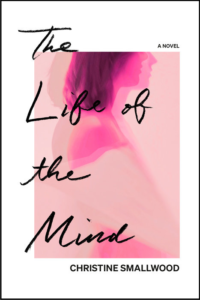
Hogarth
It would be remiss to discuss workplace novels without mentioning Christine Smallwood’s The Life of the Mind (Hogarth), a debut novel about a young professor stuck in “adjunct hell” who has recently had a miscarriage. The story lacks much of a plot, but luckily the writing has a funny yet acerbic character that propels the narrative. For example, the novel begins: “Dorothy was taking a shit at the library when her therapist called and she let it go to voicemail.” Although it could be dismissed as just another book about millennial ennui, The Life of the Mind is actually funny rather than simply pretending to be.
Fair warning: there is plenty of talk here about uteruses, fetuses, and, above all, blood, and squeamish readers will likely find this novel unreadable. Smallwood’s description of Dorothy’s condition post-miscarriage is clinically droll: “Was her body a slot machine randomly ejecting globs of blood?” she asks in the bathroom before a trip to Las Vegas. Smallwood is onto something with this debut, and fans of Sally Rooney should consider adding this to their TBR list.
•
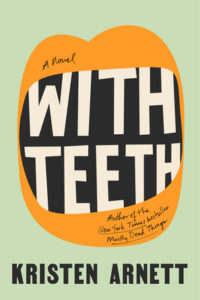
Riverhead
Sometimes the best jokes are the subtle kind: Kristen Arnett’s second novel, With Teeth (Riverhead), is not a romp, but it’s not supposed to be. Sammie is dealing with a troubled marriage and a misbehaving son, Samson, both of which “ruin the image” her partner Monika wants to promote, “a happy, well-adjusted little family of three, gay, but otherwise just like anyone else.” But, spoiler alert: it’s not going well.
Sammie’s misadventures are funny and sad; her life is a mess, but Arnett writes with such humor that it’s nearly impossible not to laugh when Samson defiantly rains dirt down on his mother’s head or spits in the mean girl’s French fries. But the best part of the book isn’t this balance between pathos and humor; rather, it’s the short vignettes between the chapters. These, told from the point of view of an array of minor characters, reframe the events of the book in disturbing ways. Still, Arnett somehow manages to make even the bleakest of stories an enjoyable read.
•

Simon & Schuster
Mona Awad’s second novel, All’s Well (Simon & Schuster), is anything but subtle. Much like her debut, Bunny, this book seems set on taking an intriguing concept and twisting it until it’s virtually unintelligible. Miranda, a theater professor, is battling chronic pain and a devastating divorce, while her untalented students rebel against the prospect of performing All’s Well That Ends Well because they want to do Macbeth. Soon three men appear, like the witches in Macbeth, and grant Miranda a kind of wish. After a heated standoff about which play to perform, Miranda snatches a script from her least-favorite student, Briana, and in doing so, somehow transfers her pain, thus freeing herself and ruining Briana’s chances at the lead.
If the plot sounds convoluted, that’s because it is. Luckily, the first half of the novel is punctuated with humor. “Reading an essay of Briana’s will make you fear for the future of America, will make you hiss, What the fuck are you talking about? aloud at the bar.” But the pithy one-liners devolve into constant call backs to the title—Miranda cannot stop telling everyone that “All’s well!”—and the ending is so bizarrely nonsensical that by the time the curtain closes, the story has lost all sense of meaning.
Published on October 21, 2021
